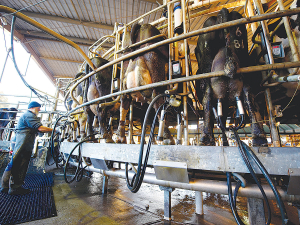NZ and Chile Sign New Agricultural Cooperation Deal
New Zealand and Chile have signed a new arrangement designed to boost agricultural cooperation and drive sector success.
 Several New Zealand farmers and investors stand to lose millions of dollars following the collapse of one of Chile’s largest dairy businesses.
Several New Zealand farmers and investors stand to lose millions of dollars following the collapse of one of Chile’s largest dairy businesses.
A group of New Zealand farmers and investors stand to lose millions of dollars following the collapse of one of Chile's largest dairy businesses.
Around 18 New Zealand dairy and kiwifruit farmers and investor - from both here and in Chile - poured over US$50m into Chilterra since its formation in 2006. Late last year the company went into "judicial reorgnaisation" owing US$60m to a consortium of banks.
Chilterra owns 7,200ha of farmland, has nine milking parlours and more than 13,000 cattle. The farms are within 100km radius of Osorno, Southern Chile, an area known for its dairy farming and similarities to New Zealand soils and climate.
Sources have told Rural News that the firm collapsed due to a combination of factors - low milk price, poor farm management practices and soaring input costs. There was also a breakdown in the relationship between majority Chilean investor Ricardo Rios and the NZ investors.
While Chilterra did well in its early years, differences emerged between NZ and Chilean business partners as more money was needed to keep the company going.
"It was very poorly run, NZ investors were kept in the dark, the company borrowed to the hilt and NZ farmers and investors had little or no say at all in the running of the company," sources say.
NZ farmers, who invested in Chilterra, are refusing to comment in fear of reprisal. The company's board was chaired by Waikato ag consultant Mike McBeath and included several New Zealand farmers as directors.
Questions from Rural News to McBeath were unanswered.
However, an email to NZ shareholders in June last year, after the company's 2021 annual general meeting, confirmed "negative working capital and negative results for the year".
The emails shows NZ investors were unhappy "with the collective performance of the board and Chilterra".
"They are deeply concerned about the financial position of the business based on the financial statements. There has never been a review of any performance despite significant differences in actual performance against budgeted performance."
The NZ investors also requested the directors to submit a vote of no confidence in the Chilterra board.
The email states that Chilterra's financials "continue to show the same trends as in the past with significant growth in liabilities".
"Granted this has been offset by significant value increases, so the technical equity reported remains static."
The NZ farmers expect Chilean banks to take a haircut and sell the farms to recoup whatever they can - leaving nothing for investors.
Success Story!
Not all New Zealand dairy investments in China have run into trouble.
Manuka SA in Chile is 80% Kiwi-owned and today has 59 dairy farms and 70,000 cattle - including 48,000 milking cows - in the South American country. Manuka produces 10% of Chile's milk.
Manuka founder Mark Townshend told Rural News that the company is achieving what it set out to do and produce NZ levels of production per hectare - 1,100-1,300 kgMS/ha - and at NZ equivalent cost of production on lower cost land assets.
"It has been a growth story starting with one man, Conall Buchannan, and one farm in 2005 and growing through a Chilean workforce of 600 people across the business today," Townshend told Rural News. "The keys to success have been 'kiwi control' and employing good Chilean executives."
Townshend says the recent sale of the Soprole business in Chile by Fonterra has provided clarity.
The milk price in Chile today is at around NZ$9.30/kgMS. Cash flows have been tight with higher interest rates, but the inflation rate is now back at 5%.
Townshend says, like in NZ, success in large scale farming in Chile is all about low-cost milk production, excellence in management and good stakeholder support and engagement.
New Zealand and Chile have signed a new arrangement designed to boost agricultural cooperation and drive sector success.
New DairyNZ research will help farmers mitigate the impacts of heat stress on herds in high-risk regions of the country.
Budou are being picked now in Bridge Pā, the most intense and exciting time of the year for the Greencollar team – and the harvest of the finest eating grapes is weeks earlier than expected.
The Real Estate Institute of New Zealand (REINZ) has released its latest rural property report, providing a detailed view of New Zealand’s rural real estate market for the 12 months ending December 2025.
Rural retailer Farmlands has released it's latest round of half-year results, labeling it as evidence that its five-year strategy is delivering on financial performance and better value for members.
OPINION: "We are back to where we were a year ago," according to a leading banking analyst in the UK, referring to US president Donald Trump's latest imposition of a global 10% tariff on all exports into the US.

OPINION: A mate of yours truly reckons rural Manawatu families are the latest to suffer under what he calls the…
OPINION: If old Winston Peters thinks building trade relations with new nations, such as India, isn't a necessary investment in…